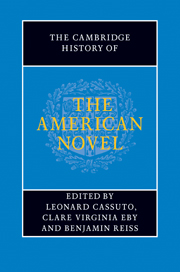Book contents
- Frontmatter
- General Introduction
- PART ONE INVENTING THE AMERICAN NOVEL
- Introduction: inventing the American novel
- 1 Transatlantic currents and the invention of the American novel
- 2 Susanna Rowson, Hannah Webster Foster, and the seduction novel in the early US
- 3 Charles Brockden Brown and the novels of the early republic
- 4 The novel in the antebellum book market
- 5 American land, American landscape, American novels
- 6 Cooper and the idea of the Indian
- 7 The nineteenth-century historical novel
- 8 Hawthorne and the aesthetics of American romance
- 9 Melville and the novel of the sea
- 10 Religion and the nineteenth-century American novel
- 11 Manhood and the early American novel
- 12 Sentimentalism
- 13 Supernatural novels
- 14 Imagining the South
- 15 Stowe, race, and the antebellum American novel
- 16 The early African American novel
- PART TWO REALISM, PROTEST, ACCOMMODATION
- PART THREE MODERNISM AND BEYOND
- PART FOUR CONTEMPORARY FORMATIONS
- A selected bibliography
- Index
1 - Transatlantic currents and the invention of the American novel
from PART ONE - INVENTING THE AMERICAN NOVEL
Published online by Cambridge University Press: 28 July 2011
- Frontmatter
- General Introduction
- PART ONE INVENTING THE AMERICAN NOVEL
- Introduction: inventing the American novel
- 1 Transatlantic currents and the invention of the American novel
- 2 Susanna Rowson, Hannah Webster Foster, and the seduction novel in the early US
- 3 Charles Brockden Brown and the novels of the early republic
- 4 The novel in the antebellum book market
- 5 American land, American landscape, American novels
- 6 Cooper and the idea of the Indian
- 7 The nineteenth-century historical novel
- 8 Hawthorne and the aesthetics of American romance
- 9 Melville and the novel of the sea
- 10 Religion and the nineteenth-century American novel
- 11 Manhood and the early American novel
- 12 Sentimentalism
- 13 Supernatural novels
- 14 Imagining the South
- 15 Stowe, race, and the antebellum American novel
- 16 The early African American novel
- PART TWO REALISM, PROTEST, ACCOMMODATION
- PART THREE MODERNISM AND BEYOND
- PART FOUR CONTEMPORARY FORMATIONS
- A selected bibliography
- Index
Summary
Like all histories, the history of the novel has always been written retrospectively, producing in the celebrated work of Ian Watt and Cathy N. Davidson powerful alignments of theories of fiction with the emergence of national narratives. In Watt's case, this involved the valorization of a masculine, middle-class individualism that, in The Rise of the Novel, he took to typify the realistic idiom of the English novel in the eighteenth century. Writing some thirty years later, Davidson identified in the early American novel a predominantly female discourse of sentimentalism, whose “distinctive voice” she understood as combating the “demoralizing derision of Anglo-European arbiters of value and good taste,” and as a counternarrative that constituted a resource for “those not included in the established power structures of the early Republic.” Both Watt and Davidson sought to inscribe generic and national types, but it is equally important to acknowledge the inherent instability of both these typological categories throughout the eighteenth century, with formal and generic mutations of the novel being akin to the amorphous, fluctuating nature of national formations. The Derridaean maxim that the “law of genre” is inherently self-contradictory since it establishes norms only for the purpose of violating them thus has a particular historical resonance in the case of the novel, since, as Homer Obed Brown notes, the novel as an “institution” did not begin to be consolidated or canonized until the early nineteenth century.
- Type
- Chapter
- Information
- The Cambridge History of the American Novel , pp. 22 - 36Publisher: Cambridge University PressPrint publication year: 2011



